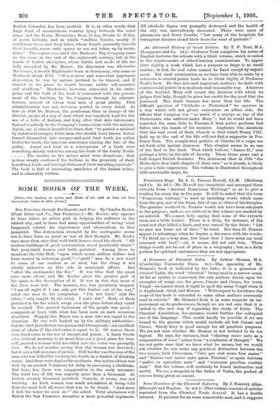SOME BOOKS OF THE WEEK. •
[Under • This heading we notice such Books of the tusk as have not been reserved for review in other forms.]
an Francisco through Earthquake and Fire. By Charles Keeler. (Paul Elder and Co., San Francisco.)—Mr. Keeler, who appears to have taken an active part in helping the sufferers in the ruined city, and to have had many opportunities of seeing what happened, relates his experiences and observations in this pamphlet. The destruction wrought by the earthquake seems not to have been as great as was at first thought. Mr. Keeler says more than once that well-built houses stood the shock. "All modern buildings of good construction stood practically intact." But jerry-built houses and halls perished. Among these he mentions the City Hall, ." upon which seven million dollars had been wasted in notorious graft,"—" graft" may be a new word to , some of our readers as so used, but the thing is not
wholly unknown on this side in municipal affairs. But "after the earthquake the fire." It was thus that the great ruin came about, and Mr. Keeler gives the greater part of his space to the description of it. It was in this that most of the lives were lost. The manner, too, was peculiarly tragical. "I am all right if I can only get this timber out of the way," cried one man to his companion. "I'm not hurt," said the other, "only caught by the wrist. I can't stir." Both of them perished in the fire which swept over the place before they could be rescued. The general behaviour of the people was good,— compared, at least, with what has been seen on such occasions elsewhere. Happily the Mayor was a man who was equal to the situation. He was well backed up by the military authorities ; but the civil jurisdiction was paramount throughout,—an excellent state of affairs if the civil ruler is equal to it. Of course there were hard cases in the use of exceptional power. A burly Swede who, without meaning to do more than get a good place for him- self, pushed a woman with her child into the water was promptly shot. We do not wonder, seeing that the woman was drowned ; but it was a full measure of justice. Still harder was the case of the man who was killed for washing his hands in a bucket of drinking water. And there were deplorable accidents. One active citizen was shot by an excited Volunteer for delay in answering a challenge. But here, too, there was exaggeration in the early accounts. The total loss of life was scarcely more than a thousand. At Lisbon seventy thousand perished. Comedy, it seems, was not wanting. An Irish woman was much astonished at being told that she must boil all water that was to be drunk. "And must I boil the water we cook in ? " she asked. Total abstainers will find in the San Francisco narrative a most powerful argument.
All alcoholic liquor was promptly destroyed, and the health Of the city was marvellously increased. There were cases of pneumonia and heart trouble, "but many of the hospitals for contagious diseases closed their doors for want of patients."


































 Previous page
Previous page